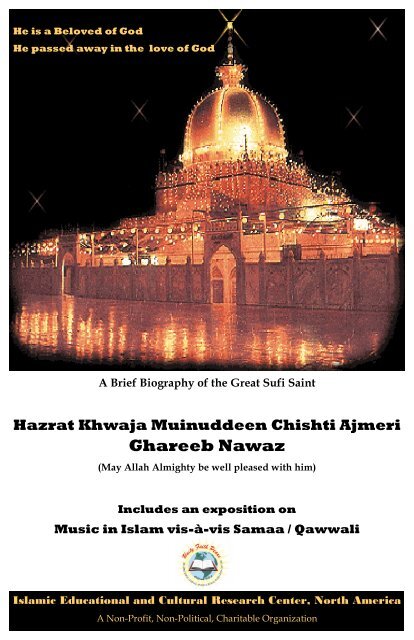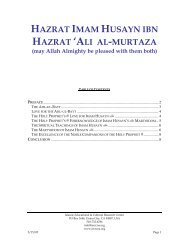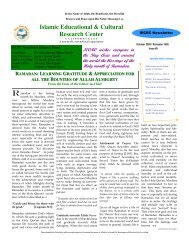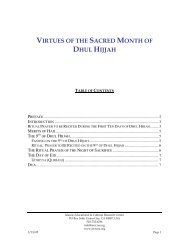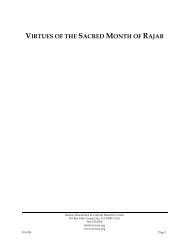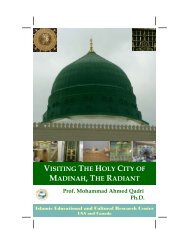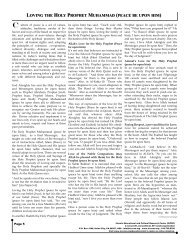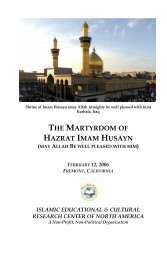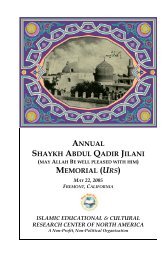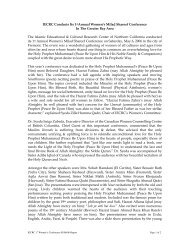Khwaja Ghareeb Nawaz rahmatullah alayh - IECRC
Khwaja Ghareeb Nawaz rahmatullah alayh - IECRC
Khwaja Ghareeb Nawaz rahmatullah alayh - IECRC
Create successful ePaper yourself
Turn your PDF publications into a flip-book with our unique Google optimized e-Paper software.
He is a Beloved of God<br />
He passed away in the love of God<br />
A Brief Biography of the Great Sufi Saint<br />
Hazrat <strong>Khwaja</strong> Muinuddeen Chishti Ajmeri<br />
<strong>Ghareeb</strong> <strong>Nawaz</strong><br />
(May Allah Almighty be well pleased with him)<br />
Includes an exposition on<br />
Music in Islam vis-à-vis Samaa / Qawwali<br />
Islamic Educational and Cultural Research Center, North America<br />
A Non-Profit, Non-Political, Charitable Organization<br />
Page 1
Part of a series of <strong>IECRC</strong> publications<br />
Date Published: July 2007<br />
Publisher:<br />
Islamic Educational and Cultural Research Center, North America<br />
P.O. Box 1646, Union City, CA 94587, USA<br />
Telephone: (510) 732-6786<br />
E-Mail: info@iecrcna.org<br />
Web: www.iecrcna.org<br />
<br />
Page 2
TABLE<br />
OF CONTENTS<br />
<br />
TABLE<br />
OF CONTENTS<br />
................................................................<br />
................3<br />
ACKNOWLEDGEMENTS<br />
................................................................<br />
....... 4<br />
BRIEF<br />
BIOGRAPHY<br />
OF HAZRAT<br />
KHWAJA<br />
GHAREEB<br />
NAWAZ<br />
(MAY<br />
ALLAH<br />
BE WELL PLEASED WITH HIM)................................<br />
.......................................<br />
5<br />
INTRODUCTION................................<br />
................................................................<br />
.................5<br />
HIS<br />
BIRTH<br />
AND LINEAGE<br />
................................................................<br />
................................6<br />
HIS<br />
EARLY<br />
LIFE................................<br />
................................................................<br />
.................6<br />
HIS<br />
EDUCATION<br />
AND TRAVELS<br />
......................................................<br />
......................7<br />
HIS<br />
PIETY<br />
................................................................<br />
..........................................................8<br />
HIS<br />
TEACHINGS<br />
................................................................<br />
................8<br />
PASSING<br />
AWAY................................<br />
................................................................<br />
.................9<br />
CONCLUSION<br />
................................................................<br />
.................. 10<br />
MUSIC<br />
IN ISLAM<br />
................................................................<br />
................ 11<br />
INTRODUCTION................................<br />
................................................................<br />
............... 11<br />
SAMAA—ITS<br />
ORIGINS<br />
AND HISTORY................................<br />
..........................................<br />
11<br />
ISLAMIC<br />
LITERATURE<br />
ON MUSIC<br />
..................................................<br />
13<br />
ECSTACY<br />
(WAJD)................................................................<br />
............. 15<br />
QAWWALI<br />
................................................................<br />
........................................................<br />
15<br />
QAWWALI<br />
AS THERAPY................................<br />
................................................................<br />
.. 16<br />
CONCLUSION<br />
................................................................<br />
.................. 16<br />
BIBLIOGRAPHY<br />
................................................................<br />
................ 17<br />
SELECTED<br />
QAWWALIS<br />
................................................................<br />
....... 17<br />
QAUL: : MANM<br />
KUNTO<br />
MAULA<br />
..........................................................<br />
17<br />
RUNG: : AAJA<br />
AJ RUNG<br />
HAI<br />
................................................................<br />
.... 18<br />
HUMAIN<br />
TO MAST<br />
KIYA ................................................................<br />
.. 21<br />
<br />
Page 3
ACKNOWLEDGEMENTS<br />
<br />
All Praises are due to Allah Almighty, the Creator and Sustainer of all the worlds and<br />
everything in them from the birds that soar high to the fish that swim deep to the ants that<br />
creep upon the earth. Countless and Choicest Blessings and Salutations upon the Beloved<br />
of Allah Almighty, the Cause of the rest of creation, the Source of creation, the Crown of<br />
creation, the Master of the jinn and humans, Whose intercession is hoped for in this life<br />
and especially on the Awesome Day when debts fall due—The Holy Prophet Muhammad<br />
(Peace and Blessings Upon Him, His Blessed Family and Noble Companions). Copious<br />
salutations also upon the Crown of the Saints, the reflection of the Holy Prophet (Peace Be<br />
Upon Him), Hazrat Shaykh Abdul Qadir Jilani (may Allah sanctify his secret).<br />
We extend our heartfelt gratitude to the reverent household whose guidance, teachings,<br />
perseverance, and magnanimity have brought us to understand the great station of our<br />
Beloved Prophet (Peace Be Upon Him) and that of the Saints of our tradition: Our beloved<br />
Amma Huzoor Bibi Maqboolun Nisa (truly she is a Lady who has earned the pleasure of<br />
Allah Almighty and His Beloved (Peace Be Upon Him) and is therefore accepted in their<br />
Respected Courts), our respected Dr. Mohammad Abdullah Qadri, and our respected<br />
Murshid Pak, Prof. Dr. Mohammad Ahmed Qadri. May Allah grant them all health and<br />
long life and may we continue to benefit from them. Ameen.<br />
The impetus for this brief work was the commemoration of the Urs Mubarak (Blessed<br />
Memorial) of the great Saint Hazrat Badshah Mian Qadri (may Allah have mercy on him),<br />
the respected father of our Murshid Pak, Prof. Dr. Mohammad Ahmed Qadri, who passed<br />
onto the Realm of Divine Beatitude on July 22, 2000, in Karachi, Pakistan. This year his<br />
Urs celebration coincides with the Urs Mubarak of the most well known Sufi Saint of the<br />
Chishti Spiritual Order in South Asia, Hazrat <strong>Khwaja</strong> Muinuddeen Chishti Ajmeri (may<br />
Allah be well pleased with him). Indeed it was upon the spiritual command of this great<br />
Chishti Saint that Hazrat Badshah Mian Qadri (may Allah be pleased with them both)<br />
migrated from India to Pakistan soon after the latter came into existence spreading his faiz<br />
(spiritual benefit) all over the Indian Subcontinent. As a tribute to the great Chishti Saint,<br />
this small token of love and appreciation is being published for the education and benefit<br />
of our community.<br />
Special thanks goes to Mr. Ayyaz Yousaf Qadri, Managing Director of <strong>IECRC</strong> whose<br />
dedication and generosity are the driving force behind the establishment of this organization,<br />
the goal of which is to spread the knowledge of and love for Allah Almighty and<br />
those Pious Personalities beloved to Allah Almighty. Our deepest gratitude to Mr. Sharaaz<br />
Khan Qadri and his respected wife Mrs. Fatima Sharaaz Qadri for their hard work, dedication<br />
and for making the annual Urs a tradition in North America. Very special thanks to<br />
Mr. Naveed Agboatwala who provided the source material for the first article. Also many<br />
thanks to Mr. Zahid Chaudhry Qadri for providing translation assistance. And last but not<br />
least, much thanks to Mrs. Ashiyana Riaz Qadri for taking time to proof read the articles.<br />
May Allah Almighty reward them all and all the wonderful people who work night and<br />
day to spread the true message of Islam - one of love, tolerance, unity and peace. Ameen.<br />
<strong>IECRC</strong> Staff<br />
July 2007, California, USA<br />
Page 4
BRIEF<br />
BIOGRAPHY<br />
OF<br />
HAZRAT<br />
KHWAJA<br />
MUINUDDEEN<br />
CHISHTI<br />
AJMERI<br />
Introduction<br />
FAMOUS AS KHWAJA<br />
GHAREEB<br />
NAWAZ<br />
(MAY<br />
ALLAH<br />
BE WELL PLEASED WITH HIM)<br />
<br />
It is the great Blessing and Mercy of our Magnanimous Creator, Allah<br />
Almighty, that He has chosen from amongst His creation, pure and pious<br />
personalities to guide humanity. After the Seal of Prophethood, our Beloved,<br />
Holy Prophet Muhammad (may the prayers and peace of Allah Almighty be<br />
upon Him, His Blessed Family and Noble Companions) this task was given in<br />
the custody of the great Saints of the Islamic tradition – the Awliya Kiram, may<br />
Allah be well pleased with them all.<br />
One of the shining luminaries in this constellation of Saints is the great Sultanul-Hind<br />
Hazrat <strong>Khwaja</strong> Muinuddeen Hasan Chishti Sanjari Ajmeri famous as<br />
<strong>Khwaja</strong> <strong>Ghareeb</strong> <strong>Nawaz</strong> (may Allah have mercy on him). <strong>Khwaja</strong> is a Persian<br />
word which means Master or Teacher.<br />
The Islamic spiritual tradition otherwise known as Tasawwuf is the Ihsan<br />
(beauty) component of the famous Hadeeth Jibril where the Angel Jibril (peace<br />
be upon him) came to teach about Islam (outward codes or Shariah), Iman (creed<br />
or beliefs), Ihsan, and the signs of the end of time. Tasawwuf is watered by 40<br />
different Spiritual Paths or Orders (Tariqas) all of which connect back to the<br />
Ocean of Knowledge and Spirituality, the Holy Prophet Muhammad (Peace Be<br />
Upon Him). The Holy Prophet Muhammad (Peace Be Upon Him) also said that<br />
the Shariah is a tree, Tariqa is its branches, Marifa (Knowledge of God) is its<br />
leaves and Haqiqa (Reality of God) is its fruit. The purpose and goal of all the<br />
Spiritual Paths is one: The love and worship of God Almighty, the love and<br />
honor of the Holy Prophet Muhammad (Peace Be Upon Him), the love and<br />
reverence of the Saints (may Allah be pleased with them all), and the love for<br />
and unconditional service to humanity. These different Paths do not divide, but<br />
they enrich as per the Blessed Hadeeth that “Differences amongst my Nation<br />
are a blessing.”<br />
Of the famous Spiritual Orders is the Chishti Spiritual Order. Although the<br />
founder of the Chishti Order was Hazrat <strong>Khwaja</strong> Abu Ishaq of Syria who later<br />
migrated to Chisht (in modern day Afghanistan, near Herat) upon the com-<br />
Page 5
mand of his Spiritual Guide (Murshid), Hazrat Mumshad Ali of Baghdad,<br />
<strong>Khwaja</strong> <strong>Ghareeb</strong> <strong>Nawaz</strong> received this title of Chishti because he was the spiritual<br />
disciple and student of many of the Saints of Chisht such as Hazrat <strong>Khwaja</strong><br />
Abu Ahmad Chishti, Hazrat <strong>Khwaja</strong> Muhammad Chishti, Hazrat <strong>Khwaja</strong> Abu<br />
Yusuf Chishti, and Hazrat <strong>Khwaja</strong> Maudud Chishti, all of whom lived, worked<br />
and are resting in Chisht. Hazrat <strong>Khwaja</strong> <strong>Ghareeb</strong> <strong>Nawaz</strong> is by far the most<br />
famous of the Chishti Saints in South Asia who brought this Order to India.<br />
May Allah be well pleased with them all. This Spiritual Order like most others<br />
traces its spiritual lineage to the Holy Prophet (Peace Be Upon Him) through<br />
Bab-ul-Ilm, the Door to Knowledge, Hazrat Ali (may Allah ennoble his countenance).<br />
Some of the famous spiritual successors of the this Order are Hazrat<br />
<strong>Khwaja</strong> Qutbuddin Bakhtiar Kaki, Hazrat Baba Fareeduddin Ganj Shakr, Hazrat<br />
Baba Mangoo Pir, Hazrat Nizamuddeen Awliya, and Hazrat Amir Khusro<br />
(may Allah be pleased with them all).<br />
His Birth and Lineage<br />
Hazrat <strong>Khwaja</strong> <strong>Ghareeb</strong> <strong>Nawaz</strong> (may Allah have mercy on him) was born in<br />
Iran; some say in Isfahan, others say in Sanjar. His birth year has been recorded<br />
as 530 Hijri which corresponds to approximately 1135/6 CE, i.e. he walked this<br />
earth almost 900 years ago. He is a descendant of the Holy Prophet (Peace Be<br />
Upon Him) tracing his lineage to Hazrat Imam Husain (may Allah be well<br />
pleased with him) through 12 generations on the paternal side and to Hazrat<br />
Imam Hasan (may Allah be well pleased with him) through 10 generations on<br />
the maternal side. His blessed father’s name was Hazrat Khawaja Ghiyasuddeen<br />
Hasan and his virtuous mother’s name was Hazrat Bibi Mahnur also<br />
known as Ummul Warah (may Allah be well pleased with his pious parents).<br />
He lost his father at the early age of 15.<br />
Hazrat <strong>Khwaja</strong> <strong>Ghareeb</strong> <strong>Nawaz</strong> is also related to the Sultan-ul-Awliya, Crown of<br />
the Saints, Hazrat Shaykh Abdul Qadir Jilani famous as Hazrat Ghaus-ul Azam<br />
by blood in that Huzoor Ghaus-e-Pak is the maternal uncle of <strong>Khwaja</strong> <strong>Ghareeb</strong><br />
<strong>Nawaz</strong> (may Allah be well pleased with both the illustrious Saints).<br />
His Early Life<br />
Hazrat <strong>Khwaja</strong> <strong>Ghareeb</strong> <strong>Nawaz</strong> inherited a grinding stone and a garden from his<br />
father which were his means of livelihood. However it so happened that one<br />
day he was visited by a great Saint Hazrat Ibrahim Qandoozi (may Allah have<br />
mercy on them both) who being impressed by <strong>Khwaja</strong> <strong>Ghareeb</strong> <strong>Nawaz</strong>’s hospitality<br />
offered him something to eat which internally transformed the great<br />
Chishti Saint to completely turn away from this world and become attached<br />
Page 6
with the Higher Realm. He sold off his grinding stone and garden and donated<br />
the proceeds to the needy and poor and began his spiritual journey in search of<br />
the Truth.<br />
Even as a child, <strong>Khwaja</strong> <strong>Ghareeb</strong> <strong>Nawaz</strong> was not like other children. His reverential<br />
title of “<strong>Ghareeb</strong> <strong>Nawaz</strong>“, which means one who bestows copiously upon the<br />
poor suited him even as an infant. If a child cried for milk in his presence, he<br />
would signal his mother to feed the child her milk and when she did so, he<br />
would laugh out of joy. As he grew older at the age of three or four years old he<br />
used to invite children of his age and feed them. He never participated in frivolous<br />
play with children of his age. On one occasion on his way to Eid prayers he<br />
saw a blind child in torn clothes. He immediately gave his own clothes to the<br />
child and took the child to the Eid prayers with him. Such was the great compassion<br />
of this ocean of mercy! May Allah sanctify his secret!<br />
His Education and Travels<br />
He received his early education at home in Khorasan (in north-eastern Iran). At<br />
the tender age of nine years he had memorized the entire Holy Quran. He traveled<br />
to Samarqand and Bukhara (in modern day Uzbekistan) which at that time<br />
were renowned centers of learning like Baghdad. He did have the honor of visiting<br />
Baghdad Shareef as well where he met with the Sultan-ul-Awliya, Hazrat<br />
Shaykh Abdul Qadir Jilani (may Allah be pleased with them both). Huzoor<br />
Ghaus-e-Pak said upon meeting him: “This young man will be a great figure of<br />
his time. He will be a source of inspiration and a center of devotion and focus of<br />
attention of myriads of people.” How true were the words of Huzoor Ghaus-e-<br />
Pak (may Allah be pleased with him)!<br />
Like a true mystic <strong>Khwaja</strong> <strong>Ghareeb</strong> <strong>Nawaz</strong> spent most of his life traveling and<br />
acquiring knowledge and in the company of the great Saints of his time. He met<br />
with his Spiritual Guide (Murshid) Hazrat <strong>Khwaja</strong> Usman Harooni (may Allah<br />
be pleased with them both) when he was in his early twenties and made the<br />
Spiritual Contract (Bai’ah) with him. He traveled and acquired much spiritual<br />
benefit from his Murshid. His travels also took him to Lahore where he visited<br />
the tomb of Hazrat Shaykh Ali Hujweri famous as Hazrat Daata Ganj Bakhsh<br />
(may Allah have mercy on him). The pinnacle of his travels was his visit to the<br />
noble cities of Makkah Mukarramah and Madinah Munawwarah. It was when<br />
he presented his reverent salutations to the Holy Prophet (Peace Be Upon Him)<br />
here that the Holy Prophet (Peace Be Upon Him) blessed him by conferring<br />
upon him the title of “Qutbul Mashaikh Barr-o-Behr”, i.e. “The Head of the Pious<br />
on the Earth and the Sea”.<br />
Page 7
His travels would take him finally to Ajmer Shareef, (in present day Rajasthan,<br />
India) where his pious personality would bring thousands of seekers into the<br />
fold of Islam.<br />
His Piety<br />
He fasted for all the 12 months of the year. He finished reading the Holy Quran<br />
twice in one day, once during the daytime and once at night. He was always in<br />
a state of ritual ablution (wudu). He prayed his morning prayer (Fajr) with the<br />
wudu of his midnight prayers (Tahajjud).<br />
Such a pious personality and such a high station with his Lord, but his concern<br />
was for his spiritual disciples. One day he was present at the Holy Kaba when a<br />
voice was heard saying: “Muinuddeen, We are pleased with you. We have<br />
forgiven you. We have granted you salvation. Ask of Us, whatever you may<br />
desire.” The great Shaykh submissively replied: “O God Almighty! Grant salvation<br />
to the spiritual disciples of Muinuddeen!” How fortunate are the ones who<br />
have given their hands in the hands of this great Spiritual Guide through his<br />
living spiritual successors (Khalifas)! His immediate Spiritual Successor, Khalifa<br />
Hazrat <strong>Khwaja</strong> Qutbuddeen Bakhtiar Kaki (may Allah be pleased with him)<br />
said that he spent 20 years in the service of his Murshid but never found him<br />
praying for his health. But instead he used to say: “O God! Wherever there is<br />
pain, grant it to your servant Muinuddin.”<br />
He was also very fond of spiritual music (Mehfil-e-Sama) which was a means of<br />
obtaining spiritual ecstasy and inner vision. Originating in Iran, its elements<br />
were made famous in Central Asia through the Maulavi Order of Hazrat<br />
Maulana Rum and in the South Asian Subcontinent through the great spiritual<br />
descendant of <strong>Khwaja</strong> <strong>Ghareeb</strong> <strong>Nawaz</strong>: Hazrat Amir Khusro, where it became<br />
famous as Qawwali (may Allah be pleased with them all).<br />
His Teachings<br />
He said that whoever gained anything, did so through service. A spiritual disciple<br />
(Mureed) should always carry out the commands of his Murshid taking to<br />
heart that whatever his or her Murshid persuades his Mureed to do and practice<br />
is for the benefit of the Mureed. By earnestly following and obeying his Murshid,<br />
the Mureed should try to reach the place where the Murshid becomes the comb<br />
of his disciple. He is related to have said that a true lover of God has nothing to<br />
do except to bow his head in submission. All good and evil emanate from The<br />
Friend (Allah Almighty). He should accept all of it including the sorrows and<br />
the pain with delight. He should do nothing against the Will of The Friend. At<br />
Page 8
all times he should be prepared to carry out the wishes of The Friend. He said<br />
that the true lover of God may severe his bond of love from his parents, brothers<br />
and sons (if they are an obstacle in the Path), and may devote himself exclusively<br />
to Allah Almighty and His Beloved Prophet (Peace Be Upon Him). He<br />
said that one who keeps his neck submitted to the Will of God, God Almighty<br />
looks after him.<br />
On the topic of repentance he said that it is of three types: to eat less in order to<br />
fast, to sleep less in order to worship, and to speak less in order to pray. He said<br />
that first comes fear, next comes hope and last comes love. Under fear comes<br />
the avoidance of sin to avoid the hell fire. Under hope comes the necessity for<br />
prayer to achieve paradise. Under love comes contemplation in order to achieve<br />
Divine Pleasure.<br />
He also said that the company of the good is better than doing good work and<br />
the company of the bad is worse than doing bad work. He said that there are<br />
ten things for the ascetic (darwesh): search for God, search for a Murshid, respect<br />
for all, surrender to God, love for all, piety, constancy and perseverance, to eat<br />
and sleep less, seclusion and last of all, prayers and fasting.<br />
He advised to listen to the oppressed and depressed, console them, pray for<br />
them and give them gifts. He said that Allah Almighty ordains that to share in<br />
someone’s sorrow and grief is nothing but another form of respectful worship<br />
of God (‘ibada).<br />
Many of his teachings are found in letters that he wrote to his beloved Mureed<br />
and Khalifa Hazrat Qutbuddin Bakhtiar Kaki (may Allah have mercy on him).<br />
Amongst his other books, traced so far, are the following in Persian: Anis-ul-<br />
Arwah – in this book he has written the discourses of his Murshid Pak, Hazrat<br />
Usman Harooni (may Allah have mercy on him); Hadith-ul-Maarif; Risala Maujudia;<br />
Kanz-ul-Asrar or Ganj-ul-Asrar – this book was written at the behest of his<br />
Murshid for the guidance of Sultan of Delhi Shamsuddin Iltutmish; Kashf-ul-<br />
Asrar; and Afaq-o-Anfas. Although <strong>Khwaja</strong> <strong>Ghareeb</strong> <strong>Nawaz</strong> spoke Persian, when<br />
in India, mutual contact brought into existence a new dialect which subsequently<br />
developed into a full-fledged language known as Urdu. <strong>Khwaja</strong><br />
<strong>Ghareeb</strong> <strong>Nawaz</strong> (may Allah have mercy on him) is therefore the founder of the<br />
Urdu language.<br />
Passing Away<br />
As per the Hadeeth that every soul must taste death, the great Saint passed<br />
onto the Realm of Divine Beatitude on the 6 th of Rajab in 627 Hijri, correspond-<br />
Page 9
ing to approximately 1229 CE. When his spiritual disciples and devotees found<br />
him in this state, on his forehead were written the words: “Haadha HabeebuLlah<br />
Maata fi HubbiLlah”, i.e. “He is a beloved of God, he passed away in the love of<br />
God.” Inna liLlaahi wa inna ilayhi raji’un. Truly we belong to God, and to Him is<br />
our return.<br />
Hazrat Baba Fareeduddin Ganj Shakr, the second generation Khalifa of Hazrat<br />
<strong>Khwaja</strong> <strong>Ghareeb</strong> <strong>Nawaz</strong> (may Allah have mercy on them both), was once reciting<br />
the Holy Quran by his blessed grave. He forgot to recite one word from Chapters<br />
Kahf and Maryam. He heard a voice coming out from the grave that he had<br />
left one word and that he should read correctly! Certainly the great Saint is<br />
alive and is still benefiting the Nation of the Holy Prophet (Peace Be Upon<br />
Him).<br />
This is why the annual Urs (Memorial) is celebrated with much devotion every<br />
year from the 1 st to the 6 th of Rajab. On the 6 th of Rajab the Qul Sharif (reading of<br />
Chapter Ikhlas a certain number of times) is held when the Urs terminates. On<br />
the 9 th of Rajab the Mausoleum (Dargah Sharif) is washed by the devotees. The<br />
Urs celebrations are attended by hundreds and thousands of fortunate people.<br />
Conclusion<br />
<strong>Khwaja</strong> <strong>Ghareeb</strong> <strong>Nawaz</strong> (may Allah be well pleased with him) was a great<br />
mystic, an outstanding preacher, and an inspired man, an erudite scholar and a<br />
great poet and writer. He was the perfect representation of the Holy Prophet<br />
Muhammad (Peace Be Upon Him). He was a true Saint amongst the Saints who<br />
are an inspiration and doorways to God Almighty during these desperate<br />
times. The Saints have always and continue to unite people standing above<br />
caste, creed, custom, color, nationality, economic status and other worldly distinctions.<br />
They have unblemished character, faith in God and love for all. They<br />
are epitomes of scholarship, surrender to God and self-control. May Allah<br />
Almighty always keep us in the company of His Saints and give us the guidance<br />
to always benefit from their presence and teachings. Ameen.<br />
Nigaah-e-Lutf Payghambar Muinuddin Ajmeri<br />
Ataae Khaaliq-e-Akbar Muinuddin Ajmeri<br />
Source: Sharib, Dr. Zahurul Hassan. <strong>Khwaja</strong> Gharib <strong>Nawaz</strong>. Lahore, Pakistan: Sh.<br />
Muhammad Ashraf Publishers,1991.<br />
<br />
Page 10
MUSIC<br />
IN ISLAM<br />
<br />
Introduction<br />
The great Persian scholar Shaykh Abu Hamid Al-Ghazzali (1058 – 1111 CE,<br />
may Allah have mercy on him) writes in his magnum opus Ihya Uloom ud-Din,<br />
that “the human being has five organs and the intellect, and every organ has<br />
got a natural attribute of the sensation of the taste of joy. The natural attribute<br />
of the eye is to see. It enjoys the sight of beautiful things, such as various kinds<br />
of leaves and plants, a flowing stream, a beautiful face. In one word, all beautiful<br />
colors and sceneries are dear to the eye. Sight of an ugly color is displeasing<br />
to the eye. The nose has been created to smell. It loves sweet scents and fragrances<br />
and dislikes bad smells and the stench of rotten things. Take the case of<br />
the tongue. It likes sweet and greasy things and dislikes bitter and distasteful<br />
foods. Hands like smooth things more than hard and uneven things. Take the<br />
case of the intellect. It feels comfort in knowledge and dislikes illiteracy and<br />
ignorance. Similar is the case of the ear. The sound which the ears hear is of two<br />
kinds: sweet sounds like the sound of the nightingale and sweet songs, and<br />
displeasing sounds like the sound of the donkey. What is true of other organs is<br />
true also of the ears.”<br />
Music is therefore the name of sounds with melody, rhythm, tune, sweetness<br />
which may or may not have meaning for the human being. Sounds can be without<br />
rhythm as well which may still be pleasing such as someone talking in a<br />
calm manner. Sounds however can be displeasing as well as mentioned above<br />
such as the braying of a donkey. Sounds may be produced by nature such as<br />
the rustling of leaves, waves on the ocean or by birds, or by the human voice.<br />
This brief exposition is concerned with the melodious sounds of the human<br />
being and some musical instruments that carry meaning in the religious context.<br />
Samaa - Its Origins and History<br />
Most (Arab music in the pre-Islamic period) was used for dancing and marching,<br />
accompanied by drums and flutes. It caused emotion and made the serious<br />
--minded feel light. The Arabs continued this way during their desert and pre-<br />
Islamic period. Then, Islam made its appearance. The thriving religion (of Islam)<br />
and (Muslim) religious severity was directed against all activities of leisure<br />
and all the things that were of no utility in one's religion or livelihood.<br />
Therefore, (music) was avoided to some degree. In their opinion, only the cadenced<br />
recitation of the Qur'an and the humming of poetry which had always<br />
been their way and custom, were pleasurable things. (Khaldun)<br />
Page 11
It is very likely that the word Samaa takes its roots from the Arabic word sami’a<br />
which means “he heard”. Since music is heard through the ears, hence the term<br />
Samaa. Originally music was considered a branch of philosophy and mathematics.<br />
Al-Kindi (801 – 873 CE) of Iraq was a Muslim scholar of music, with<br />
famous compositions demonstrating the impact of melodies on the human<br />
body and soul. He was the first to realize the therapeutic qualities of music. In<br />
his book Tales of Wise Men (p376-377, European publication, issued in Baghdad),<br />
Jamal El-Din El-Qafti relates that "once a son of Al-Kindi's neighbor became<br />
dumb. That man was a great tradesman whose son undertook all his affairs.<br />
Thus, he was greatly worried. He consulted innumerable physicians but<br />
none could treat his son. However, although he frequently scorned Al-Kindi<br />
and discredited him, he had to consult him too. Coming to the boy and testing<br />
his blood pressure, Al-Kindi summoned his students who were accomplished<br />
lute players. He ordered them to sit before the boy and keep playing various<br />
melodies. While doing this, Al-Kindi continued testing the boy's blood pressure.<br />
The boy gradually became refreshed, and then he sat up and began to<br />
speak while the students kept playing. Al-Kindi asked the boy's father to consult<br />
his son regarding his business, which he rapidly did and recorded everything.<br />
Afterwards, the musicians felt tired and stopped their tune, so the boy<br />
returned to his former state. When the father requested that they should continue<br />
playing, Al-Kindi replied: ‘Nay, it was an episode in his life. No one can<br />
lengthen another person's life. Your son has fulfilled the divine term.’ In fact,<br />
the man's son suffered mental damage, which became so complicated that it<br />
caused his death.” (Abu Reidah)<br />
Al-Farabi (870 – 950 CE) of Persia wrote on the effects of music. He said: “…<br />
man and the animal under the impulsion of their instincts emit sounds that<br />
express their emotions, as they can be one of joy or fear. The human voice expresses<br />
greater variety – sadness, tenderness, rage. These sounds in the diversity<br />
of its notes cause in the person that listens to them such shades of feelings<br />
or passions, raising him, controlling him or tranquilizing him.” (Al-Farabi)<br />
Shaykh Al-Ghazzali (may Allah have mercy on him) writes that “Samaa means<br />
religious songs with a sweet voice. He further says that the heart is the seat of<br />
secret wealth and it is the invaluable mine of jewels. There lies in it the most<br />
valuable jewel, just as fire lies secretly in stone and iron. It lies hidden in such a<br />
way as water lies in the lowest bottom of earth. There is no means of waking it<br />
up from sleep without sweet sounds. There is no path of sound entering into<br />
heart without the door of the ear.” (Al-Ghazzali)<br />
By the end of the 11 th century, Samaa was a spiritual concert, in which music<br />
Page 12
was mainly sung, sometimes by a soloist, sometimes by a chorus, including<br />
instrumental elements of varying importance. The concert took place under the<br />
direction of a Shaykh. The solo singing was provided by a cantor. The faithful<br />
listened to the music seated, in a state of inner contemplation, and allowed<br />
themselves to be gradually overcome by trance. Return to calm and normality<br />
was likewise brought about by the sound of music suitable for that purpose.<br />
(Nayyar)<br />
Islamic Literature on Music<br />
Imam Malik prohibited songs and Imam Shafi’i said that Samaa is reprehensible<br />
(makruh). May Allah be pleased with both the great scholars of Islamic Jurisprudence<br />
(Fiqh). The question that arises though is that did they mean that all<br />
songs and all gatherings of Samaa are blameworthy?<br />
God Almighty says: “The worst of sounds is surely the sound of (the) donkey.”<br />
This verse also praises sweet sounds. Imam Al-Ghazzali presents some<br />
Hadeeth literature which allows for the hearing of sweet sounds. The Holy<br />
Prophet (Peace Be Upon Him, His Noble Family and Companions) said:<br />
“Adorn the recitation of the Quran with your sweet voice.” He (Peace Be<br />
Upon Him) once praised Abu Musa Ash'ari: “You have been given an instrument<br />
out of those of the family of David.” The Holy Prophet (Peace Be Upon<br />
Him) also said: “God did not send any Prophet without a sweet sound.” He<br />
(Peace Be Upon Him) also said: “If a man recites the Quran with a sweet<br />
sound, God hears his recitation more than one hears the songs of his female<br />
singer.” One Hadeeth praised the Prophet David (peace be upon him) by saying:<br />
“David used to sing with so melodious a sound that men, jinn, beasts<br />
and birds gathered together spell bound to hear it. Nearly four hundred persons<br />
expired thus by hearing his songs.” If Samaa is held unlawful, then to<br />
hear the sound of nightingale is also unlawful. If to hear the sound of nightingale<br />
is lawful then will it not be lawful to hear sweet and melodious sounds<br />
which have got wisdom and good meanings? (Al-Ghazzali)<br />
Hazrat Mumshad Ali of Baghdad (may Allah be well pleased with him), at<br />
whose command the Chishti Spiritual Order was established, said: “I asked the<br />
Holy Prophet (Peace Be Upon Him) in a dream: ‘O Messenger of God, do you<br />
dislike anything of Samaa?’ He (Peace Be Upon Him) said: ‘I don't dislike it,<br />
but tell them that they should begin it with a verse of the Quran and finish it<br />
with its verse.’” Hazrat Junaid Baghdadi (may Allah have mercy on him) said:<br />
“In three places, mercy is bestowed on people: at the time of meal as they do<br />
not eat unless hungry, at the time of Zikr as they make Zikr staying upon the<br />
high rank of the Truthful and at the time of hearing Samaa, as they hear it being<br />
Page 13
engrossed with love and see the Truth with the veritable eye.” Also it is recommended<br />
to recite the Call to Prayer (Adhan) with a good voice.<br />
If too much oil is besmeared on face, it looks ugly. So also if too much Samaa<br />
songs are heard, it forms into a habit which is bad. However, after strenuous<br />
efforts and hard labour, Samaa songs and innocent enjoyments are not bad.<br />
Samaa is therefore lawful in general, and unlawful under special conditions.<br />
Samaa is unlawful in 5 cases:<br />
1. To hear Samaa from a woman whose looks excites sexual passion. Beardless<br />
boys may also be included in this category if sexual passion is aroused<br />
at their sight. This illegality is not for songs but for women and beardless<br />
boys.<br />
2. Instruments of songs of drunkards are unlawful as they remind of unlawful<br />
things and incite unlawful action of wine-drinking and intoxicants.<br />
These are Majamir, Autar and Kubah but not Daf, flute and other musical<br />
instruments.<br />
3. Obscene talks in Samaa are unlawful. If there is any obscene talk in poetry,<br />
useless talks and accusations against God Almighty, His Prophet (Peace Be<br />
Upon Him) and Companions (may Allah be well pleased with them), they<br />
are unlawful. If there are descriptions of a particular woman and not of<br />
women in general, and narrations of the beauties of a particular woman<br />
before the people, they are unlawful.<br />
4. If any evil or immoral desire arises in the mind or by hearing songs, it will<br />
be unlawful.<br />
5. If a habit is formed for hearing Samaa, then listening to it is unlawful. Excess<br />
of anything is bad. If too much food is taken it is bad for health. (Al-<br />
Ghazzali)<br />
The sound of an animal with life is not separate from the sound of a lifeless<br />
instrument. So to hear the sound of a man in whatever form it comes out of his<br />
throat is not unlawful except to hear the sounds of such instruments which<br />
Islamic Law (Shari’a) expressly prohibited: Kuba, Majamir and Autar. These are<br />
not made unlawful because they emit sweet sounds. If it would have been<br />
made unlawful for this reason, all things which man enjoys would have been<br />
unlawful. The reason for their being unlawful is that they were connected with<br />
wine which was made unlawful and these instruments helped the drinking of<br />
wine. This is very similar to the impermissibility of living with an unknown<br />
woman in a room because it aids cohabitation. These specific instruments reminded<br />
them of wine- drinking and hence were explicitly prohibited.<br />
There are three stages of Samaa songs. (1) The first stage is the understanding<br />
of the meaning of Samaa songs, (2) the second stage is ecstasy (wajd), and (3) the<br />
Page 14
third stage is the movement of bodily limbs as a result of ecstasy.<br />
Ecstasy (Wajd)<br />
Ecstasy arises out of a mental condition which is of two kinds. One kind is<br />
Mukashafa (Opening from the Unseen World) and Mushahada (Witnessing of the<br />
Unseen World) which lead to unseen and unthinkable knowledge. Another<br />
kind leads to unthinkable change, fear, and repentance. Songs only awaken<br />
these conditions. If there is a change in the sound or movement of limbs as a<br />
result of songs, it is called ecstasy or wajd. The fear of God is called ecstasy.<br />
Many a time, the Sufis fell into ecstasy after hearing the melodious recitation of<br />
the Holy Quran. The Holy Prophet (Peace Be Upon Him) said: “The chapter<br />
Hud and similar chapters have made me grey-haired.” This is nothing but ecstasy.<br />
The Holy Prophet (Peace Be Upon Him) was once reading: “If you punish<br />
them, they are merely your servants.” He (Peace Be Upon Him) began to<br />
weep. God praised such persons of ecstasy by saying: “When they hear what<br />
has been revealed to the Prophet, you will see their eyes shedding tears as<br />
they perceived truth.” It has been reported that when the Holy Prophet (Peace<br />
Be Upon Him) prayed, a voice could be heard from his blessed chest like the<br />
sound of heated cauldron. The Holy Prophet (Peace Be Upon Him) said to<br />
Hazrat Ali (may Allah ennoble his countenance): “You are from me and I am<br />
from you.” At this good news, Hazrat Ali (may Allah be well pleased with him)<br />
began to dance. (Al-Ghazzali) This is wajd.<br />
Qawwali<br />
Qawwali is the South Asian term for the Mehfil-e-Samaa. Hazrat Amir Khusro<br />
(1253-1325 CE), a famous Sufi Chishti saint and an expert both in Indian and<br />
Persian music is credited with the introduction of Persian and Arabic elements<br />
into South Asian music. Of particular importance are two musical forms: Tarana<br />
and Qaul, which is said to be the origin of Qawwali. However, there is evidence<br />
that Qawwali predates Hazrat Amir Khusro: the great Sufi Masters of the<br />
Chishtiya and Suhrawardia Orders of South Asia were admirers of the Qawwali<br />
and the Saint, Hazrat Qutubuddin Bakhtiar Kaki (may Allah he pleased<br />
with them all) is said to have passed away in 1236 while in a musical trance<br />
induced by a Qawwali. (Nayyar) Today the majority of the Samaa gatherings<br />
start with the Qaul and end with the Rang which are Hazrat Amir Khusro’s<br />
(may Allah be pleased with him) two famous compositions. The Qaul is the<br />
Prophetic Hadeeth that exhorts people to hold Hazrat Ali (may Allah ennoble<br />
his countenance), through whom majority of the Spiritual Orders have reached<br />
us, in the highest honor. The Rang according to many traditions are the lines<br />
that Hazrat Amir Khusro recited ecstatically when he came back to his blessed<br />
Page 15
mother after meeting his beloved Murshid Hazrat Nizamuddeen Aulia (may<br />
Allah be well pleased with both Murshid and Mureed) for the first time, after a<br />
long search for an ideal Sufi Master. Hazrat Amir Khusro had composed approximately<br />
500,000 verses in the Persian language and was affectionately<br />
known as Tuti-e-Hind (Nightingale of India). Apart from being a minister in the<br />
Moghul court, a poet, a musician, a brave warrior, he was also a great Saint of<br />
Allah and the most beloved Mureed of Hazrat <strong>Khwaja</strong> Nizamuddeen Aulia<br />
(may Allah have mercy on them both.)<br />
Qawwali / Samaa as a musical form is closely linked to the Sufi tradition of<br />
Islam and the particular practices that Sufi scholars developed to achieve closeness<br />
to God. The medium of Qawwali is used to present the deep mystical, philosophy<br />
of Sufi Islam. It is no wonder that this medium attracted throngs of<br />
people in India into the fold of Islam by attending the gatherings of Samaa of<br />
Hazrat <strong>Khwaja</strong> Muinuddeen Chishti (may Allah have mercy on him) who was<br />
commanded by his Murshid to institute these gatherings for the benefit of the<br />
people.<br />
Qawwali as Therapy<br />
The therapeutic effects of Qawwali were always generally known and indigenous<br />
doctors often told mentally disturbed individuals to attend Qawwali sessions.<br />
Spiritual leaders even today often take their mentally disturbed followers<br />
to a Qawwali session with the object of exposing them to the harmony and<br />
therapeutic powers of the music and words. Aware of this effect of Qawwali<br />
and himself deeply interested in it, an eminent Pakistani psychiatrist is using<br />
"Qawwali Therapy" on some of his patients with marked success. While still in<br />
an experimental stage, this powerful medium can surely provide an effective<br />
indigenization of occidental therapeutic techniques. (Nayyar)<br />
Conclusion<br />
It is then established that music is not forbidden in Islam in an absolute sense. It<br />
depends on what the music is accomplishing. If it is a means for something<br />
lawful then it is lawful. If it is a means for something unlawful then it is unlawful.<br />
It is not be listened to simply for musical enjoyment (ladhdha). There is an<br />
etiquette (adab) and a purpose connected to Samaa without which listening to it<br />
could become blameworthy and even impermissible. However when the goal is<br />
to achieve closeness (qurba) to our Lord and Creator, and the environment is<br />
one of piety where the presenters and the audience are in a state of ritual purity<br />
(wudu), then the possibilities of purification, healing, and spiritual progress<br />
abound.<br />
Page 16
Bibliography<br />
1. Abu Reidah, Dr. Muhammad Abdul-Hadi. Islam Set: Science Environment<br />
and Technology. 14 July 2007 .<br />
2. Al-Farabi. d'Erlanger, Baron Rodolphe (translator). Kitabu al Musiqa. Paris:<br />
P. Geuthner, 1959.<br />
3. Al-Ghazzali, Abu Hamid. "Music and Ecstasy." Karim, Fazl-ul (translator).<br />
Ihya Uloom ud-Din Vol 2 Ch 9. n.d.<br />
4. Khaldun, Ibn (1332-1406). "The craft of singing (and music)." Khaldun, Ibn.<br />
Al-Muqaddimah Ch5 Sec 31. n.d.<br />
5. Nayyar, Adam. "Origin and History of the Qawwali." 1988. Lok Virsa Research<br />
Centre, Islamabad, Pakistan. 14 July 2007 .<br />
<br />
SELECTED<br />
QAWWALIS<br />
<br />
Qaul: Man Kunto Maula<br />
Ali imaam-e-manasto manam Ghulaam-e-Ali<br />
hazaar jaan-e-giraamii fidaa-e-naam-e-Ali<br />
Ali is the master of all, I am the slave of Ali<br />
thousands life are to be sacrificed for Ali .<br />
man kunto maulaa<br />
fa Aliun<br />
To whom I<br />
maulaa<br />
am the Master<br />
Ali<br />
is the Master.<br />
Note: The above is a famous hadith of the Holy Prophet Muhammad .<br />
Hazrat Ali (may Allah be pleased with him) was his cousin and son-in-law.<br />
Lyrics: Amir Khusro<br />
Published April 2nd, 2007<br />
http://nusrat.info/man-kunto-maula/<br />
<br />
Page 17
Rung: Aaj Rung Hai<br />
Maati K Tum Deewaray, Maati K Tum Deewaray, Jo Suno Hamari Baat (2)<br />
Aaj Milaavra Piya Ka Tum Jaguo Sari Raat<br />
O walls of clay, listen to what I have to say<br />
Today I have found My Beloved (Hazrat Nizamuddin Awliya<br />
Night Vigil<br />
), Stay up in<br />
Aaj Rung Hai Ree Maan Rung Hai Ree (2)<br />
Mairay Khuwaja K Ghar Rung Hai Ree<br />
Mairay Mehboob K Ghar Rung Hai<br />
Today there is the glow (rung) of my Spiritual Guide, O Mother such glow!<br />
At my <strong>Khwaja</strong> Muinuddeen’s<br />
At my Beloved Nizamuddin’s<br />
Home there is glow<br />
Home there is glow<br />
Aaj Sajn Milaavra Moray Aangan Mein (2)<br />
Today I found my Beloved in my Courtyard<br />
Ey Aahay Mein Peer Payo Nizaam Uddin Auliyah<br />
Mohay Peer Payo Nizaam Uddin Auliyah Mohay Peer Payo<br />
Sabir Ala Uddin Auliyah Mohay Peer Payo<br />
Data Fareed Uddin Auliyah Mohay Peer Payo<br />
Khuwaja Qutub Uddin Auliyah Mohay Peer Payo<br />
Khuwaja Moin Uddin Auliyah Mohay Peer Payo<br />
Meeera Mohhauddin Auliyah Mohay Peer Payo<br />
Ey Data Gunj Baqsh Auliyah Mohay Peer Payo<br />
I found my Spiritual Guide Hazrat Nizamuddeen Auliyah<br />
I found my Spiritual Guide Hazrat Sabir Alauddeen Auliyah<br />
I found my Spiritual Guide Hazrat Baba Fareeduddeen Ganj Shakr<br />
I found my Spiritual Guide Hazrat <strong>Khwaja</strong> Qutbuddeen Bakhtiar Kaki<br />
I found my Spiritual Guide Hazrat <strong>Khwaja</strong> Muinuddeen Chishti<br />
I found my Spiritual Guide Hazrat Shaykh Abdul Qadir Jilani<br />
I found my Spiritual Guide Hazrat Daata Ganj Baksh<br />
Payo Nizaam Uddin Auliyah Nizaam Uddin Auliyah Alauddin Auliyah<br />
Mein To Jab Daikhoon Moray Sung Hai Ree Ma Rung Hai Ree<br />
Dais Badais Mein Dhoond Phiri Hoon (2)<br />
Page 18
I found Nizamuddeen Auliyah , Alauddeen Auliyah<br />
When I look he is with me, O Mother what glow!<br />
I have searched the entire world, near and far<br />
Gokal Daikha Mathra Daikha, Per To Sa Na Koi Rung Daikha<br />
Porab Daikha Pacham Daikha Uttar Daikha Dakkan Daikha<br />
I have seen Gokal and Mathra but not seen a glow such as your<br />
I have seen the East, the West, the North, the South<br />
Tohay Dhoond Phiri Hoon, Tohay Dhoond Phiri Hoon<br />
Mohay Tora Rung Mun Bhaayo Moin Uddin (2)<br />
Mohay Apne He Rung Mein Rung Lay Khuwaja Ji (2)<br />
Mohay Rung Basanti Rung Day Khuwaja Ji (2)<br />
I have roamed around searching for you<br />
I love your glow O Muinuddeen<br />
Immerse me in your glow O Master Muinuddeen<br />
Immerse me in the spiritual colors of Spring O Master Muinuddeen<br />
Churiaan Penai, Chundarya Uraii, Khaasi Dulhanya Banayi<br />
Ey Mori Churioon Ki Laaj Khuwaja Rakhna (2)<br />
Yeh To Pehn Layi Ub Rut Rakhna (2)<br />
I have donned the ornaments of spirituality, the dress of spirituality and become<br />
a spiritual bride<br />
Protect my honor O Master Muinuddeen<br />
Now I have worn them, now you must protect me<br />
Ey Tero Haath Hai Mero Suhaag Khuwaja<br />
Mein To Joog Na Tum Pe Luta Baithi<br />
Jo Tu Maangay Rung Ki Rangai (2)<br />
Mora Joban Girwi Rakhlay Khuwaja Ji<br />
My life is in your hands O Master Muinuddeen<br />
I have sacrificed my entire life for you<br />
Whatever is the cost for you to immerse me in your glow (is acceptable to me)<br />
You can pawn my youth O Master Muinuddeen<br />
Ahay Dais Badais Mein Dhoond Phiri Hoon<br />
Mohay Tora Rung Manwayo Moin Uddin<br />
Aiso Rung Aur Na He Daikho Kaheen Bhi (2)<br />
Ahay Nizam Uddin Auliya Jag Ujiaro<br />
Page 19
Ey Jag Ujiaro Jagat Ujiaro (2)<br />
I have searched the entire world<br />
I love your glow Muinuddeen<br />
I have not seen such a glow anywhere else<br />
O Nizamuddeen Auliya my world is illuminated<br />
My world is illuminated, my universe is illuminated<br />
Khuwajgaan K Darbaaran Mein<br />
Aaj Daikho Gun Garjay (2)<br />
Rus Boonda Barsay Meharwa Rus Boonda Barsay<br />
In the court of all my spiritual masters<br />
Look today there is thunderous (glow)<br />
And the rain of spirituality<br />
Ey Sub Sakhiyan K Paas Piya Hein<br />
Mora Piya K Milan Ko Jiyara Tarsay (2)<br />
All my friends have their loved ones close to them<br />
I yearn for the union with my Beloved<br />
Khuwaja Moin Uddin Khuwaja Qutub Uddin<br />
Ganj Shakar Mehboob E Ilahi<br />
Khuwaja Nizam Uddin Khuwaja Nasir Uddin<br />
Aaj Shohra Nizaam O Naseer Uddin Ka<br />
Laal Mehboob Bana, Laal Mehboob Bana (2)<br />
O Master Muinuddeen<br />
O Ganj Shakr<br />
O Master Nasiruddeen<br />
Today is the day for Nizamuddeen<br />
The Beloved (Nizamuddeen<br />
, O Master Qutbuddeen<br />
, O Beloved of the Lord, Master Nizamuddeen<br />
) is honored<br />
and Nasiruddeen<br />
Ey Woh To Jo Maangay Per Sung Hai Ree Maa Rung Hai Ree (2)<br />
Aaj Rung Hai Ree Maan Rung Hai Ree<br />
Whatever you ask for, he is with me, O Mother such glow!<br />
Today there is glow, O Mother such glow!<br />
Source: Lyrics: http://www.geocities.com/karachiiterulez/aajrung.html,<br />
http://www.sabiree.com/sufism/sama_book/sama8.htm<br />
<br />
Page 20
Humain to Must Kiya<br />
(Favorite of Hazrat Badshah Mian Qadri, may Allah sanctify his secret)<br />
Humain to must kiya Kali Kamli Waley ney<br />
Arab key chand Madiney key rehney waley ney<br />
Lost am I (in love) with He (s) who owns a black cloak(s)<br />
The Brilliant Moon of Arabia, the One who lives in Medina (s)<br />
Saat he saal mai jangal tha ghar aangan tera<br />
Bakriyon ka woh charana, woh larakpan tera<br />
At the tender age of seven, your home was the wilderness<br />
At the early age of boyhood, to sheep was your tending<br />
Woh babhoolon mai darakhshaan rukh-e-roshan tera<br />
Zikr karti rahie koyal yahie punkpun tera<br />
Unique is your countenance shining among thorns harsh and dry<br />
And that’s what said the Koyal (Cuckoo bird) as it sat singing high…<br />
Humain to must kiya Kali Kamli Waley ney<br />
Lost am I (in love) with He (s) who owns a black cloak(s)<br />
Jab Muhammad (s) ko huwey poorey baras ikiyaawan<br />
Shoq Khaaliq ko huwa deykheyn jamaal-e-roshan<br />
And when Muhammad (s) reached that full age of life in fifty-one<br />
Wished his Creator shall He gaze upon his shining light<br />
Huwa Jibreel ko you hukm-e-Khuda wand-e-zaman<br />
Le ke jaa jald Buraq ab tu suwey Jadd-e-Hassan<br />
Thus commanded was Jibreel (as) by the Lord of all Creation<br />
Take swiftly with you Buraq to the Grandfather of al-Hassan (ra)<br />
Aur kehna ke hain Aaraastah jannat key chaman<br />
Chal key bharlo gul-e-makhsoos sey apna daaman<br />
And say that the road to Paradise for him (s) has been adorned<br />
So come and take what’s due to you that has been gifted (salaat, fasting, Hajj,<br />
intercession for the Ummah)<br />
Pohonchey Jibreel Muhammad (s) ka Jahan tha maskan<br />
Arz karney lagey qadmon pey jhuka key gar-dan<br />
Page 21
And when reached Jibreel (as) that blessed home of Muhammad (s)<br />
The reverent feet near which he exclaimed lowering his neck…<br />
Humain to must kiya Kali Kamli Waley ney<br />
Lost am I (in love) with He(s) who owns a black cloak(s)<br />
Huriyon ki Shab-e-Mairaj mey thee dhoom padi<br />
Ulfat-e-Shah-e-Zaman dil mai sinna ban key gadi<br />
For the Hurs on the Night of Mairaj waiting in anxious hope<br />
Struck deep like an arrow their love for the King of all Men (s)<br />
Lab pey thaa pan ka lathah na to missi ki gadi<br />
Deykey o jis ko woh so naz-o-adaa sey thee kadi<br />
Neither were leaves of Pan nor Missi that which adorned their lips<br />
Each were seen standing proud of their own beauty<br />
Yak-ba-yak aamad-e-Mehboob ki aa-iey jo gadi<br />
Wahin huron ki bhi qismat pa-ay deedar adi<br />
Suddenly just as time arrived for the Beloved (s) to appear<br />
So was it time for the Hurs to gaze upon him (s)<br />
Gir-tey pad-tay kahin Hazrat pey nazar un ki padi<br />
Yeh sada aa-iy jo hansli kisi heykal sey ladi<br />
Falling one over the other their eyes soon set upon him (s)<br />
And thus arrived their realization, such beauty has no comparison<br />
Humain to must kiya Kali Kamli Waley ney<br />
Arab key chand Madiney key rehney waley ney<br />
Lost am I (in love) with He (s) who owns a black cloak(s)<br />
The shining Moon of Arabia, the One who lives in Medina (s)<br />
<br />
<br />
Page 22
Page 23
About the Founder<br />
Prof. Dr. Mohammad Ahmed Qadri is the Founding and Executive Director of <strong>IECRC</strong>,<br />
Northern California. Dr. Qadri is a renowned scholar from Pakistan who taught at<br />
colleges there as well as the University of Karachi, Pakistan for over 20 years. He has<br />
expertise both in modern education as well as traditional Islamic sciences having<br />
completed the Dars-e-Nizami: An 18 year traditional Islamic course from Pakistan and<br />
has studied with scholars from Al-Azhar University, Cairo.<br />
Dr. Qadri’s goal at the <strong>IECRC</strong> is to foster and promote the light and love of our beloved<br />
Master, Prophet Muhammad (prayers and peace of Allah Almighty be upon Him), the<br />
Saints of our tradition, and service to humanity. <strong>IECRC</strong> fosters love for and understanding<br />
of the previous Messengers of the Abrahamic faiths including Prophet Jesus and<br />
Prophet Moses (peace be upon them both).<br />
About <strong>IECRC</strong><br />
<strong>IECRC</strong> is a non-profit, non-political organization, devoted to providing academic and<br />
spiritual resources to diverse religious and cultural groups. <strong>IECRC</strong> was established in<br />
2002 and is based in Fremont, California. As a community service organization, it is based<br />
on the model of the centuries old Islamic tradition of bringing peace and harmony to society<br />
by addressing the essential needs of people regardless of their cast, creed, color or<br />
religion.<br />
ISLAMIC EDUCATIONAL AND CULTURAL<br />
RESEARCH CENTER OF NORTH AMERICA<br />
A Non-Profit, Non-Political, Charitable Organization<br />
P.O. Box 1646<br />
Union City, CA 94587, USA<br />
Email: info@iecrcna.org<br />
Website: www.iecrcna.org<br />
Phone: (510) 732-6786<br />
Page 24


